Just 21 then, a young air force officer looks back at the 1971 war, which was like a baptism by fire in the fauj.
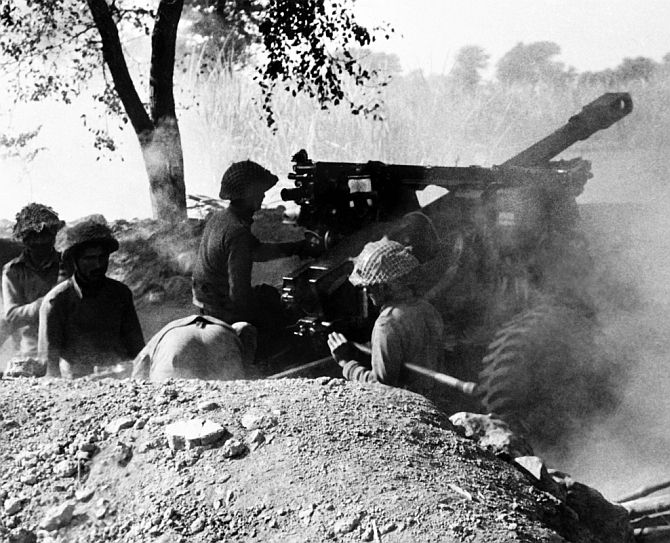
'Our tank took a direct bull's eye hit. When I came back to my senses I called for the driver, loader, subedar -- nobody answered. Three men from my tank died that night.'
Wing Commander Kuldip Shiva (retd) tells Rediff.com's Archana Masih about days spent along the Ravi river on the border with Pakistan as a forward air controller attached to an armoured brigade.
Earlier in the Oral History series on the 1971 War:
- The Men who made History
- The general who 'created' Bangladesh
- 'We fought the battle as if it was the last thing we'll ever do'
- 'Gen Manekshaw could speak to politicians like no other chief has'
I was 21 when the war broke out. I had just been commissioned in June 1971 and was flying the Hunters.
I was attached to the army unit in Jalandhar with the 1 Tactical Air Centre that coordinated the air effort with the corps headquarters.
I along with a few others was trained as a forward air controller. The job of the FAC was to direct fighter aircraft onto the enemy target as required by the army.
Around September-October, we were moved to our forward location. I was moved to Amritsar.
We had dinner in the Officers Mess and three of us were put in a jeep to go to the brigade where we were to be deployed with the army.
As luck would have it, among us, one was my senior, the other was my coursemate -- Syed Muqarram Ali and A Azmi -- very dear friends of mine.
The three of us were sitting in the back of a jonga, it was raining and the ride continued endlessly. Finally, we landed up in Fatehgarh Churiyan, which is on the east of Dera Baba Nanak.
Azmi and myself were deputed in the 14 Armoured Brigade (part of the 71 Armoured Regiment) and Syed Muqarram Ali was sent somewhere else.
We were close to a forward location. Soldiers were living in tents. I was given a tube well hut with a cot.
In the day I used to be up and about and only came there to sleep.
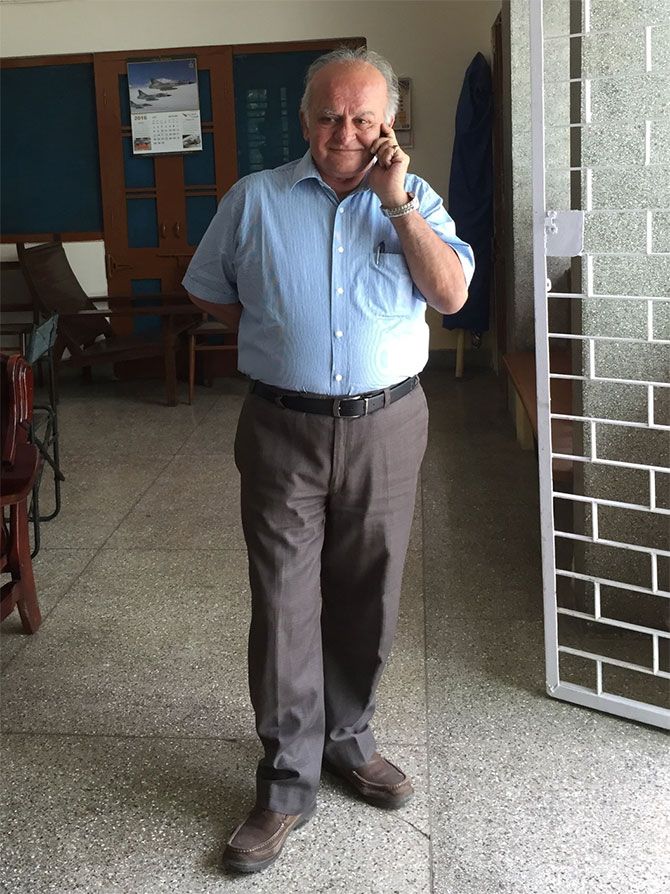
Towards the end of November, we moved into our ops location, just outside Dera Baba Nanak.
There was a BSF camp in the field where the tanks were deployed under camouflage.
The wireless vehicle was there and instruction was given by the commanding officer that whenever 'Cactus-Lily' (the name of the IAF's operation in the War) was heard, he was to be informed immediately.
The third evening, we suddenly heard shelling south-west of us. We saw the flares and artillery fire from both sides. 'Cactus-Lily' was heard.
It had been planned earlier that when we moved into Dera Baba Nanak, we were meant to go into a mango orchard and park ourselves there to launch the attack.
On the night of December 4, the regiment moved across the Ravi to go across the Dera Baba Nanak bridge to capture the bridge on the Pakistan end.
Intelligence personnel from armoured regiment had been sent across to check whether the Ravi could be crossed in tanks. They had a probe to determine the strength of the soil.
I was in the tank with the cupola open with this firing going on and we moved further down.
The shelling came close by and we closed the cupola.
There were ditch and tank bunds -- we were able to even them out on our side and go across.
But in getting across to the Ravi, three tanks got bogged down -- so the orders were for two squadrons of tanks to change their directions.
Now instead of the northern end, the plan changed to the southern end of the bridge.
On the tanks was the Gorkha paltan -- the infantry that was to go and hold the place.
In the shuffle of change in plan, I came 2nd or 3rd in the leading troops.
We fired the shell, but it got stuck. Two of us were trying to take out the shell manually -- it is supposed to eject automatically.
We came under a direct bull's eye hit on the base.
The driver's head fell on the side. The subedar sahib was killed and his pistol was left in the dummy barrel in the back. It was dark.
When I came back to my senses I called for the driver, loader, subedar -- nobody answered.
The loader was crying out in pain so the first thing we did was get out of the tank.
I opened the capola, came out and realised I had left my call sign which was a wireless set.
I did not want the enemy to get hold of it.
I jumped in and got it out.
Our flying overalls also had the first aid kit which had morphine injections.
I gave the loader a shot of morphine and came to the next tank and found that the tracks of that tank had come off.
I then went to the next tank, the officer said he could take only one chap, I told him to take the loader and then got inside the next tank.
We were ordered to get back to the mango orchard. This was the morning of December 5.
That night, three people in my tank had died. Two or three tanks were knocked off in the firing.
In the evening the commanding officer said you have a good life because not only did you get out alive from that tank, but when you moved from one tank to another you had walked over minefields.
The battle had stagnated in Dera Baba Nanak and it was now air to air combat where my actual job came up.
We had targets that were identified by the army and you informed the tactical air centre about the location of the target.
Across the Dera Baba Nanak bridge there was a watch tower where the Pakistanis had an artillery observation post, from where they were knocking over our positions.
Our Sukhoi 7 knocked it down and that tower kept blazing for a long time like a torch.
After that we had peace as far as enemy artillery was concerned.
When I was coming back after December 16 -- the sub divisional magistrate of Batala and his wife had come to see where the battle had taken place. The misfortune of the lady was that she stepped on a mine and her leg got blown off.
After the war I went to Jamnagar to finish flying on the Hunters.
There was so much of wisdom in the judgement of Sam Manekshaw who had the guts to go to the prime minister that we could not attack in April-May.
He was an outstanding leader. Elegant and with a sense of humour. He commanded respect.
I remember him once telling the men, "Yeh mooch dekhte ho, mooch neechi nahi honi chahiye (See this moustache. It should not droop)."
No unnecessary bhashan. Simple words, driven home.
After the war, he went to a PoW camp in Meerut.
A subedar came and saluted him. General Manekshaw asked his permission to see the camp.
He went to the toilets and shook hands with the sweeper. He asked the soldiers if there were bed bugs/mosquitoes and how the food was.
When he was leaving, the subedar told him that today he had realised how the Hindustani fauj defeated the Pakistani fauj.
Here the army chief came to the see the jawan, while over there, the officers of the paltan could not be found.
He was a role model.
Three months after General Manekshaw retired, the government decided to lower the soldier's pension from 70% of the last drawn salary to 50%, and increased the civilian officials to 50% from 30%.
It was 70% earlier because the soldier retires at an earlier age. This is how Indira Gandhi rewarded him for the victory after he retired.
Wing Commander Kuldip Shiva served the Indian Air Force for 31 years.








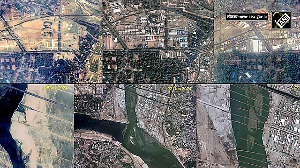
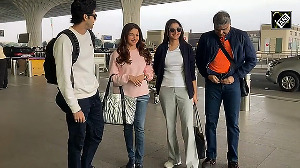
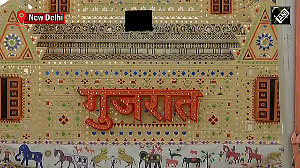
 © 2025
© 2025